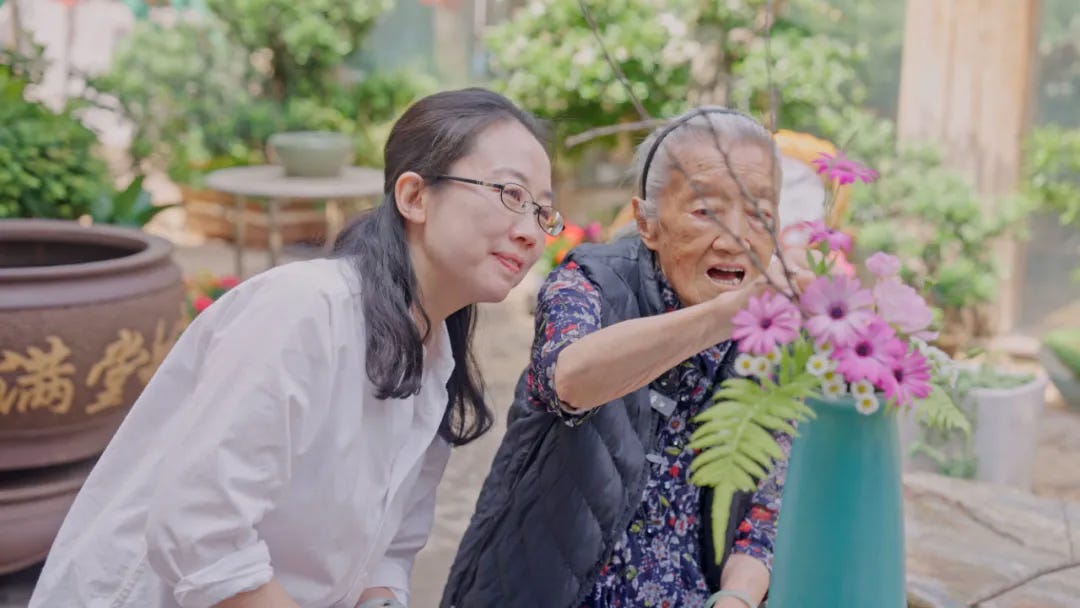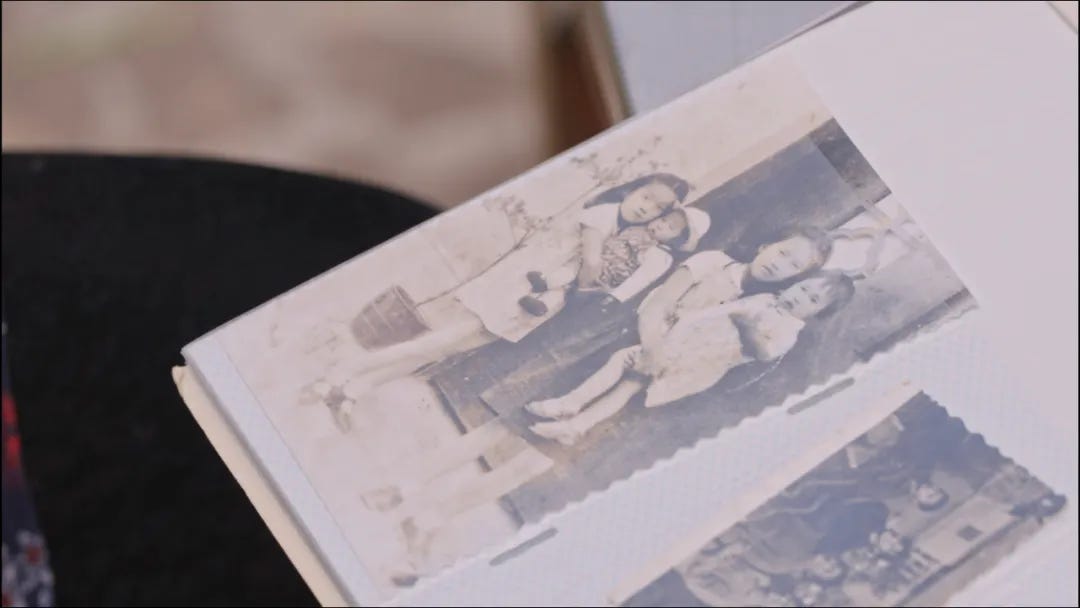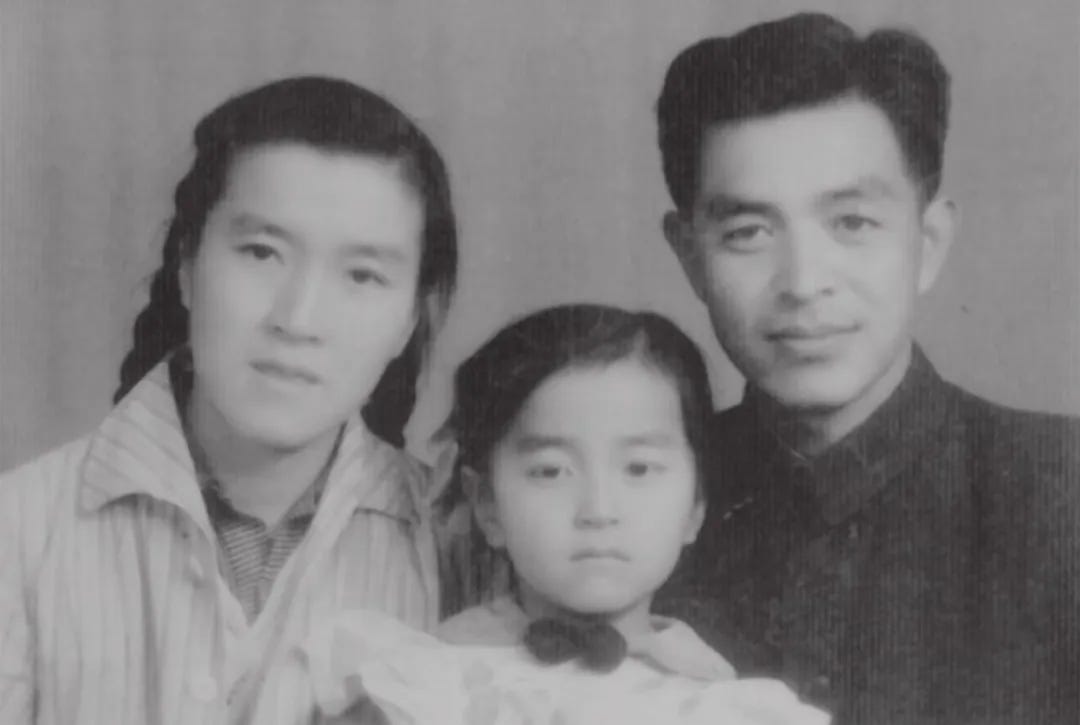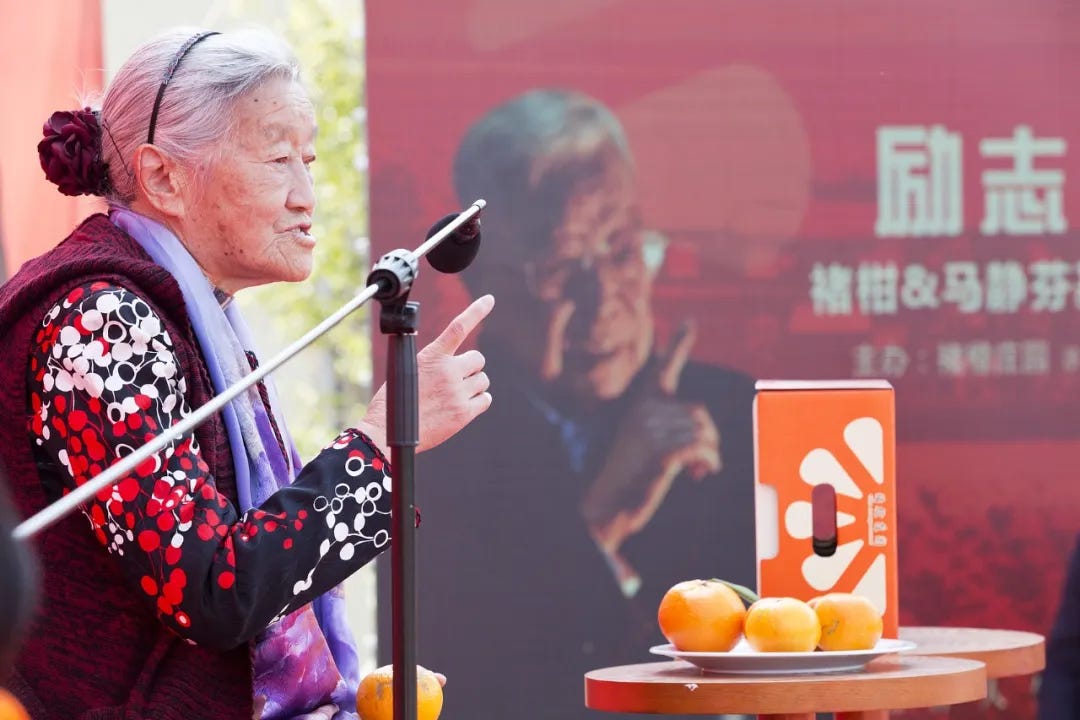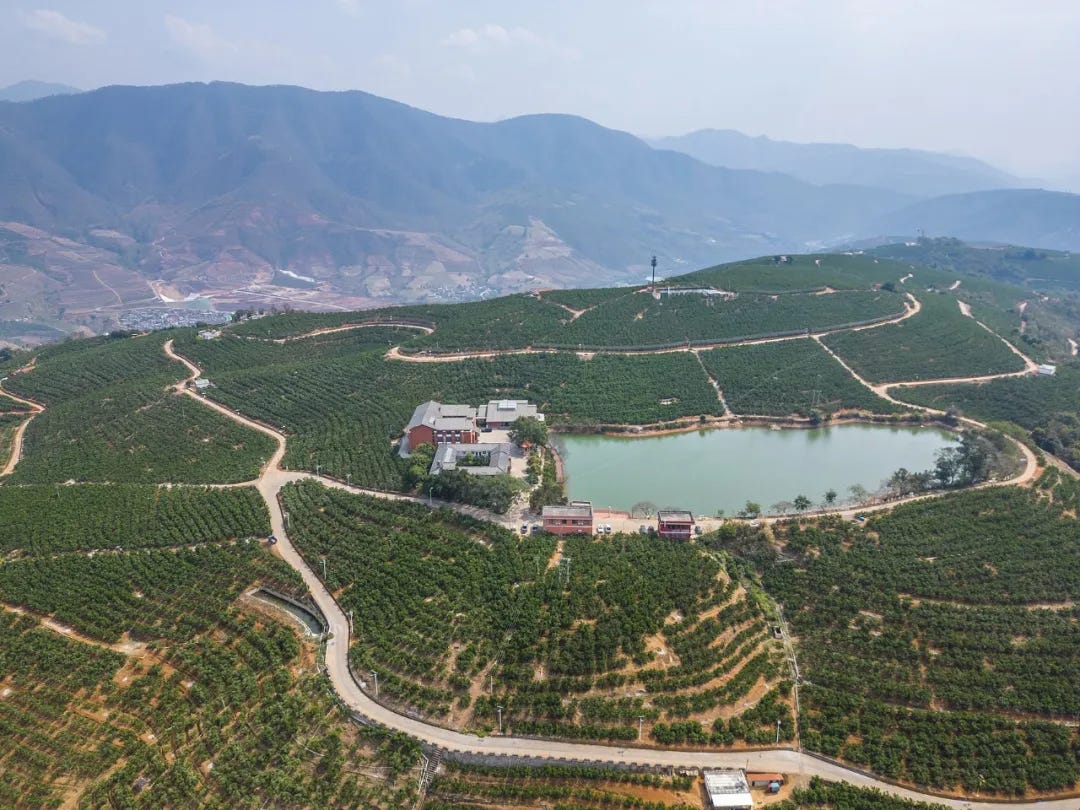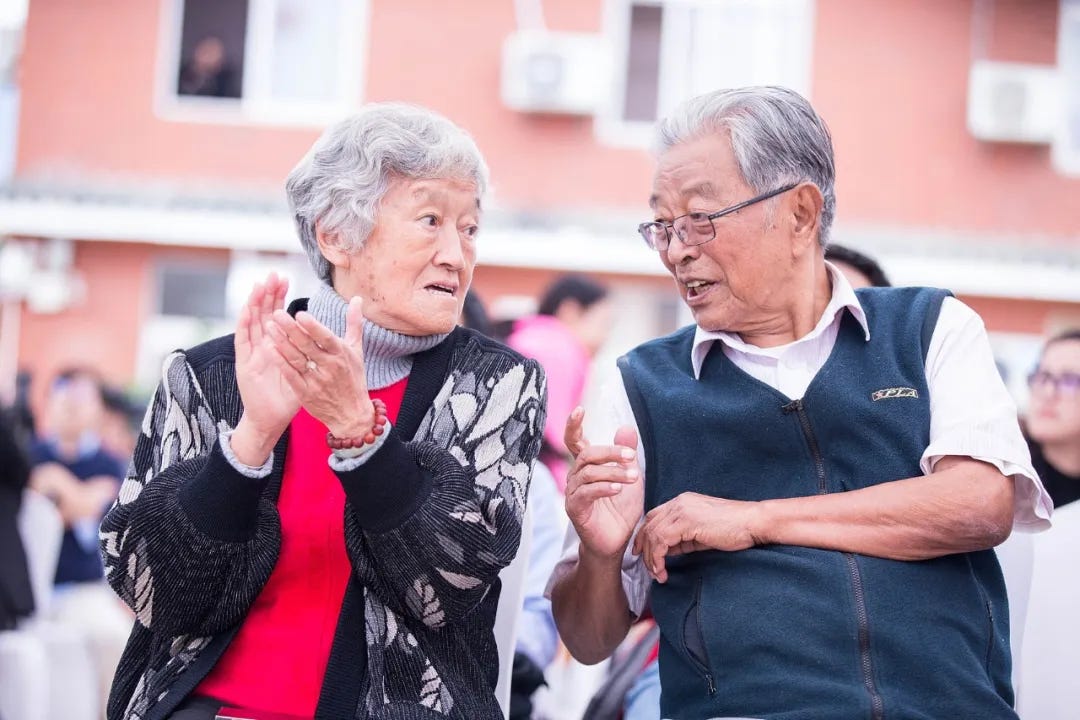Good evening. After injuring my foot last year, the recovery hasn’t gone as well as expected, so I’ll be having surgery tomorrow. That means there won’t be many updates from me this week. Today, I wanted to share a story I had originally planned to publish last week.
It’s about Ma Jingfen, a 93-year-old Chinese entrepreneur whose life has unfolded across the dramatic arcs of China’s modern history. For a long time, she was recognized mainly as the wife of Zhu Shijian — the man known as China’s “tobacco king” — but in recent years, she has quietly stepped into the spotlight in her own right.
Ma was born in 1932 in China, into the family of a senior bank executive. Defying her family’s wishes for an arranged marriage, she left home and joined the military, serving as a young woman in China’s border defense forces. After retiring from the army, she worked as a primary school teacher in rural Yunnan for nearly two decades. In 1955, she married Zhu Shijian. Just three years later, Zhu was labeled a “rightist” and sent to a labor farm during a political campaign. In 1960, Ma moved to the farm with their daughter and took up work raising pigs.
After the landmark Third Plenary Session of the 11th Central Committee of the Communist Party of China (CPC) in 1978, Zhu was politically rehabilitated — a formal reversal of his earlier political classification. Between 1979 and 1994, he built the Hongtashan cigarette brand into a national powerhouse and turned Yuxi Cigarette Factory into one of Asia’s leading tobacco enterprises.
Yet in the 1990s, China still lacked a dynamic system to properly incentivize state-owned enterprise leaders. This gap contributed to corruption risks — Zhu, whose personal income fell far short of his contributions, was eventually convicted on economic charges and imprisoned. He was released on medical parole in 2001 due to complications from diabetes.
In 2002, at the age of 74, Zhu and Ma embarked on a second venture, this time planting oranges on barren hills in Yunnan. By 2012, their oranges — later known as "Chu Oranges" — gained nationwide popularity through e-commerce platforms and were frequently sold out.
Zhu passed away in 2019 at the age of 91. But Ma didn’t stop.
Now 93, she remains active and full of initiative. She has started a new business selling blueberries, embraced short video platforms to share life reflections, and in April published a floral design collection featuring her work and insights on Chinese ethnic floral aesthetics.
What draws me to Ma’s story is how closely it mirrors China’s own transformation. She was born before the People’s Republic of China was founded. She has been a soldier, a teacher, a rural laborer, and later a quiet witness to — and participant in — one of the most iconic entrepreneurial journeys of China's reform era. After the age of 80, she began to take on more responsibility for her family’s business affairs. In a country where decades can feel like centuries, Ma Jingfen’s journey — full of reinvention and quiet resilience — offers a rare and powerful window into China’s lived history.
The story was originally published on 新周刊 New Weekly’s WeChat blog. You can also watch the video version of the story here. This is the fourth episode of the second season of 极限女性 Women at the Edge, a feature interview series by New Weekly that explores how women push boundaries and redefine their limits.
She used to be known as “Chu Ma-shi”—Mrs. Chu. But now, she’s simply Ma Jingfen. No longer just the woman behind her famous husband, she’s carved out a name and legacy all her own.
From the headstrong daughter who refused to be obedient, to the young soldier who wouldn’t accept injustice, Ma Jingfen’s spirit first stirred in those early rebellions. That spark never faded. At 93, she’s still launching new ventures and even learning how to make short videos. This “high-energy 90-something” doesn’t believe in retirement, and probably never will.
In Season 2 Episode 4 of Women at the Edge by New Weekly, Ma sits down for an exclusive interview. She didn’t know what feminism meant back then, but through her choices and actions, she claimed the right to make her own decisions.
Six years have passed since China’s “Tobacco King” Chu Shijian died. His life was legendary, full of dramatic highs and lows, and he left behind more than a story. He left “Motivational Oranges” and tens of thousands of acres of orchard. After he passed, Ma Jingfen, his partner, just kept going.
At 93, she’s more active than ever: starting a blueberry business, embracing the short-video boom to share her wisdom on camera, and even publishing a book of her floral arrangement work last month. She recently sat down with experts to talk about the unique art of Chinese flower design.
Compared to many millennials, this “post-90” lives a fuller, more energetic life. She jokes about living to 100 “at the very least,” and when young fans come to see her, she always sends them off with a hearty “Go get it!” For her, retirement isn’t even on the table. Keeping busy isn’t about passing the time, it’s about doing what feels right.
She lives like someone who’s always switched on. There’s a steady flame inside her that just keeps burning. And it begs the question: where does all that energy come from?
01
93 and Still Hustling
Ma Jingfen starts her day at 7:30 a.m., checking on the flowers and vegetable seedlings in her yard, giving detailed instructions to the workers. She spots a wilted flower instantly. She knows exactly which batch of homemade sauce isn’t fermenting right. Nothing escapes her.
Books are scattered across the sofa and corners of the entryway—titles on AI, healthy aging, even The Book of Changes (I Ching). When she’s not out and about, she’s reading and learning. She likes flipping through ancient texts while figuring out how best to arrange red blossoms with green leaves.
Gardening has its headaches too, like pests. “Pesticides don’t work, but without them, bugs eat everything,” she says. So she dives into her phone to search for answers. “Some of the videos are legit because they’re pulled from huge databases. Others are useless, you listen forever and learn nothing.” She saves the good ones, and when a trendy new slang term pops up, she calls a friend to decode it.
And she’s not just watching videos. She’s making them too. In recent years, Ma has started appearing in short clips herself. She reads every script carefully, marking them up with a red pen. On set for a brand collaboration, she straightened her clothes and joked, “Let’s not mess it up this time. If I collapse, who’s going to take responsibility?”
At a product launch, Ma Jingfen waited quietly for her turn to speak. Since starting her businesses, cameras and crowds have become a constant presence. (Photo/Visual China Group)
She puts real effort into filming, but doesn’t care much about the views. One of her clips where she rolls up her sleeves and says “Let’s get to work!” got over 100,000 likes. Her reaction? A shrug: “I just did what I thought needed to be done.”
She was 69 when she and Chu Shijian climbed the Ailao Mountains to start growing their now-famous Motivational Oranges. Since then, she has been at the forefront of late-in-life entrepreneurship.
She later launched Chu Liquor to fulfill Chu’s dream of returning to winemaking, something he had dabbled in as a young man. It all started when a young visitor brought distilling equipment to the orchard. That moment lit a spark in Chu, and the couple decided to take the leap. In 2015, they bought a distillery in Yuxi.
The liquor captured Chu Shijian’s original dream, and Ma Jingfen’s deep memories. After his passing, she kept the business alive. She’s often seen riding shotgun in a pickup truck to the distillery, meeting guests from all over the country.
In the afternoon of April 24, more than 30 visitors from Zhejiang, Sichuan, Hubei, and beyond arrived at the factory. Ma Jingfen had barely sat down before a wave of phones went up, snapping photos, recording videos, placing phones next to the mic to capture her words. She’s used to speaking off the cuff, often starting with a simple, “So, what do you want to hear today?”
At the end of every speech, Ma Jingfen always leads the audience in a rousing chant: “Let’s get to work!” (Photo provided by the interviewee)
That day, she shared how she once traveled across provinces to Maotai Town to seek advice from a seasoned master, all to make her liquor more aromatic and refined. She’s never been shy about the humble beginnings of that journey, even openly admitting that, due to health reasons, she rarely drank alcohol in the past. As she revisited her entrepreneurial story, this elderly woman still showed her sense of humor. “Don’t get too drunk tonight,” she said with a smile. “If you do, you’ll mess up your contract.” The crowd burst into knowing laughter.
Beyond running a distillery, Ma Jingfen also dabbles in small ventures just for fun. Even after turning 90, she’s still quietly building new businesses without fanfare. Her latest project involves blueberries. When the blueberry trees bore fruit for the first time, she brought a basket of berries to her son and said, “I grew these. Try one.” It was only then that he realized his mother had started yet another business on her own.
But Ma Jingfen isn’t just an elderly hobbyist. She’s a clear-headed, hands-on leader with sharp management instincts. What she values most is keeping her managers' thinking in check. If someone strays off course, she doesn’t hesitate to act.
Once, she discovered that a relative who helped manage the business had secretly transferred sales funds into their personal account. Ma confronted them with evidence, but the person denied everything. Calmly, she responded, “If it’s money you want, I can give it to you. But if you can’t even admit you were wrong, do you still care about your reputation?” Then, right in front of the family, she fired the relative on the spot. At her age, money isn’t her top concern anymore, but she can’t tolerate people who refuse to face right and wrong.
This “post-90s” entrepreneur isn’t just relentlessly active, she’s also a proud multitasker. In April this year, Ma Jingfen’s Floral Art Collection was officially published. The book is a culmination of her decades of experience in flower arranging and a birthday gift to herself at 93. Though she picked up the skill later in life, she never let tradition limit her creativity.
On the day of her Women at the Edge interview, Ma Jingfen (right) created an arrangement centered on small chrysanthemums and dried branches. (Photo/New Weekly)
While others say red and green should never go together, Ma takes inspiration from nature, observing how red flowers and green leaves coexist in harmony. “They’re both bold and honest, like farmers with that kind of strength,” she said, clapping her hands and miming a hoe swinging through the air.
Her schedule is packed and her thoughts are always flowing. Ma Jingfen’s energy doesn’t come from being unable to slow down, it comes from being fully awake. Her clarity comes not only from constant learning but also from choosing her own path time and time again, and enduring everything that comes with it.
02
The Second Daughter Who Dared to Say “No”
Ma Jingfen was born before the founding of the People’s Republic of China, into the family of a senior bank executive. Known as the “second daughter,” she wore leather shoes and rode in rickshaws when she went out. Thanks to her father’s job transfers, she had the chance to live in big cities like Wuhan, Chongqing, and Shanghai. To outsiders, she was one of the rare children of that era who had truly seen the world.
Frequent school transfers in her youth caused her to fall behind academically. At 12, she was still in first grade and couldn’t recite the multiplication table. Even now, in her 90s, she still remembers the shame of being called on in elementary school and not knowing the answer.
The young Ma Jingfen (far left) holding her younger sister. (Photo/New Weekly)
Back then, girls who didn’t do well in school had their futures already mapped out. Her mother insisted she go on blind dates, saying, “If you don’t study, you get married. If you won’t marry, I’ll blow you up.” But Ma Jingfen pushed back. “My mother is too soft,” she said. “I’m not like that.” During one cousin’s arranged visit, she let the family’s guard dog loose, scaring the suitor away. After that, the whole extended family said, “That second daughter is a little strange.”
When she heard the military was recruiting, Ma cut off her waist-length hair and signed up. In an era when bandits still roamed the countryside, joining the army was more than a political choice, it was also a way for women to escape the confines of home. Ma Jingfen carved out a third option for herself, rejecting the idea that she had to either study or marry.
Life in the army might not have matched her home’s comfort, but it gave her a new kind of independence. When a commander unfairly scolded her one time, she didn’t back down. “He was wrong about me,” she said. “So I had to speak up.” She was only 17, but she stood up for herself in a male-dominated world. Even with little formal education, she had a natural resilience that refused to give way.
In 1951, Ma Jingfen (center, back row) with her comrades at the Border Defense Bureau. (Photo provided by the interviewee)
From being the headstrong daughter who refused to be obedient, to the soldier who wouldn’t accept injustice, Ma Jingfen’s early years were all about awakening. She may not have known the term “feminism” then, but through her actions, she claimed the right to make her own choices.
03
The Woman Who Weathered Life With Her Husband
If Ma Jingfen fought for freedom in her youth, she became someone completely different in marriage, and at one point, even a woman overwhelmed by love.
In 1955, she married Chu Shijian. Three years later, he was labeled a “rightist” and sent to a harsh labor farm. Upon hearing the news, Ma took her young daughter and went to join him. She even transferred her household registration from the city to the countryside, prepared to spend the rest of her life there. Divorce never crossed her mind. Her only thought was keeping their family of three together.
In those chaotic times, Ma Jingfen chose to stay by Chu Shijian’s side. (Photo provided by the interviewee)
No one forced her to do it. In an era when family members rushed to cut ties with political outcasts, Ma took the hardest road on her own. Overnight, she lost touch with almost everyone she knew and became a “rightist’s wife”, someone everyone kept at arm’s length. Life at the labor farm took a toll on her body. She had to carry her child to work every day, often stopping to catch her breath along the way. At night, wild snakes and rats disturbed her sleep.
Even so, she never once brought up the “rightist” label in front of Chu or tried to guilt him with her suffering. She stayed silent to protect his dignity. In that old photo, you can see the tension in her furrowed brow. She swallowed her pain without complaint.
In an old photo, Ma Jingfen is frowning. (Photo provided by the interviewee)
Back in those days, she often felt confused and stifled. Even now, she sometimes vents to the younger generation: “He never cared about me… all he ever did was work.”
Someone once asked her if Chu Shijian had ever said anything tender to her. She thought about it for a moment and recalled only one instance—when someone looked down on her, Chu quietly said, “Who dares? I’ll deal with them.” She laughed and added, “Of course he was joking.” But that one “joke” became the most vivid memory of feeling protected in their 60-plus years of marriage.
“Back then, I was really just a clueless woman. I didn’t study, and all I cared about was whether Chu Shijian cared about me,” she admitted. “I wasn’t independent yet. Who else could I rely on but him?” Her words are heartbreakingly honest.
But she didn’t stay stuck in that state for long. In interviews now, she’ll say with conviction, “If he hadn’t reshaped me, I wouldn’t be who I am today.” She endured hardships, but she also learned to grow. Those passive years of following along eventually became the whetstone that sharpened her into someone clear-eyed and self-assured.
She was a reflection of countless “dutiful wives” of her generation, but she was also one of the few who woke up amid the struggle, gathering strength in silence to eventually shift her own path. She didn’t give up, didn’t run away, and didn’t sugarcoat the truth. Marriage wasn’t her destination. It was the forge she had to pass through.
04
Ma Jingfen’s Rebirth at the Crossroads of Fate
During those tumultuous years, Chu Shijian was transferred from a farm to a sugar factory, and then later, after the reform era began, to a tobacco company. Much like how she had followed her father from city to city as a child, Ma Jingfen had to adapt to new jobs and new challenges every few years. The difference was, time had honed her. She was no longer the passive, compromising young woman she used to be.
In The Biography of Chu Shijian, there’s a story about this time. Right before the sugar factory merged with a paper mill that made paper from bagasse, Chu needed a smart, educated partner to help improve paper quality. Since most workers at the plant lacked formal education, he thought of his wife. Sensing his trust, Ma Jingfen left her teaching job of over 20 years to join the paper mill as a quality inspector. She had zero experience with papermaking, but she had an unshakable determination. Just a month later, the paper they developed together shocked even the Yunnan Provincial Light Industry Department.
Later, when they moved to Yuxi Cigarette Factory, she was appointed deputy head of the landscaping department. On her first day, she tore down all the illegal structures cluttering the plant, giving the place a fresh new look. When she noticed the workers lacked confidence, she organized flower arrangement classes and led the team to win city-level awards, helping those behind-the-scenes staff feel seen and valued.
She always found a way to make real change, even in roles others might see as minor. When fate turned again, she was no longer a background player trailing behind. She had become a true partner who could help blaze a trail forward. By the time Chu Shijian was released from prison, both he and Ma Jingfen were nearing 70. This time, she faced the steepest learning curve of all: starting a business with him.
In 2002, the couple planted their first batch of sugar oranges on Ailao Mountain. Ma Jingfen remembers those early fruits being so bad, “not even pigs would eat them.” Chu and his team worked around the clock to improve the soil and growing techniques. Once the oranges finally lived up to their sweet name, it was Ma Jingfen who took on the marketing. She brought them to trade fairs, and in a market where branding barely existed, she came up with a simple slogan: “Sugar Oranges Grown by Chu Shijian.” It was direct, straightforward, and incredibly persuasive.
On March 25, 2018, in Yuxi, Yunnan, Ma Jingfen explained how the look of a fruit relates to its flavor. (Photo/Visual China Group)
As the oranges began to sell, Ma Jingfen’s health took a turn. She was diagnosed with late-stage rectal cancer. When the doctor delivered the news, she said, “Don’t give me a sentence—three months, six months, a year. When it’s time to go, I’ll go.” The doctors recommended six rounds of chemotherapy; she only did two before going home to recuperate.
Relying on traditional Chinese medicine, enzymes, and pure willpower, she went on to live more than 20 years. “Most people don’t die of cancer,” she said. “They die of fear. They see the diagnosis and can’t eat, can’t sleep. If even healthy people stop eating and sleeping, of course they won’t last long.”
Her brush with cancer only made her walk even steadier. The Chu Orange Estate on Ailao Mountain was Ma Jingfen’s vision. Though nearly 80 and unable to read blueprints, she sat in on meeting after meeting with the designers, offering input and pushing for revisions.
The original plan had called for dark grey exterior walls, but Ma Jingfen thought that felt too gloomy. She asked the designers to close their eyes and imagine a black-grey complex rising on a mountainside. “Doesn’t it look like a graveyard?” she asked. That one comment changed their minds, and the walls were ultimately painted a warm, reddish-orange to match the sunny vibe of the orchard.
The Chu Orange Estate sits on a mountainside in Gasa Town, Yuxi, Yunnan. (Photo/Visual China Group)
At the grand opening of the estate, Ma Jingfen walked onstage to thunderous applause. Looking around, she said, “The estate is built and passed inspection. I used to just be ‘Mrs. Chu,’ but from today on, I’m Ma Jingfen.” The crowd burst into applause again.
Chu Shijian who sat and witnessed this later joked that Ma was “trying to stand shoulder to shoulder” with him. Ma Jingfen smiled as she recalled it: “It wasn’t that he thought I was capable—he finally acknowledged me as a person. I wasn’t just the woman behind him anymore.”
From then on, she stood beside China’s “tobacco king” as an equal, charting new paths together. That wasn’t just an introduction, it was a statement, a distillation of decades of endurance, growth, and self-definition.
In 2015, at the Ailao Mountain Chu Orange Estate, Chu Shijian and Ma Jingfen attended a press event side by side. (Photo/Visual China Group)
05
Not Young, Just Clear-headed
Ma Jingfen is 93, but her clarity, drive, and spirit put many younger people to shame. She never tried to live up to anyone’s expectations and never bought into the idea that “you’re old, so it’s time to retire.”
“When is retirement supposed to happen?” she’s said more than once. “I can tell you: not a single day.” Despite her age, she still shows up at events and insists on speaking. “If one day I collapse on stage, don’t blame anyone—not the organizers, not the audience. I’m over 90, I’ve lived through it all. As long as I can still contribute, I’m happy. And if I really can’t get back up, well, maybe I’ll get to go to heaven.” It’s not just about defying physical limits. It’s about embracing purpose, fully and fiercely.
At a short video shoot with Ma Jingfen. (Photo provided by the interviewee)
Ma Jingfen is a living, growing force. Even in her nineties, she keeps learning, thinking, and creating. She uses her phone to study how to grow vegetables, hosts flower-arranging classes for young people, makes videos, and manages her own media presence. She refuses to let age define her, and she’s never backed down simply because she’s a woman.
She didn’t walk a path to success. She carved one, step by step, until she finally became Ma Jingfen.





